#mykenai
Text
How Argive Was the "Argive" Heraion? The Political and Cultic Geography of the Argive Plain, 900-400 B.C. by J. M. Hall
#article#argive plain#argolid#argos#mycenae#mykenai#tiryns#argive heraion#history#archeology#archaic greece#hera argeia#hera
3 notes
·
View notes
Text
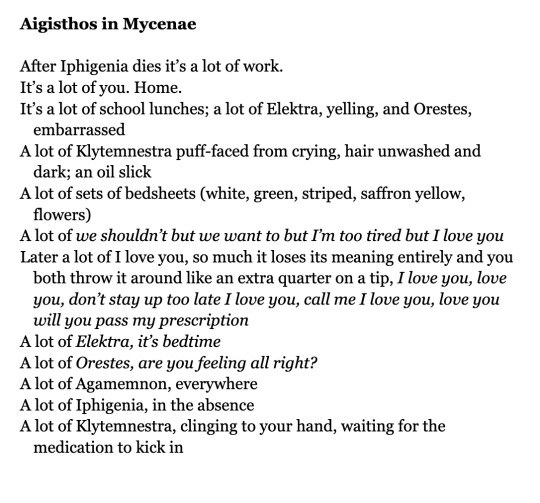
Aigisthos in Mycenae, Casey J. King
#aigisthos#aegisthus#casey j king#june original#HOUGH. hes important to me.#also sourry for spelling aigisthos and then also spelling it mycenae. consistency? who's that#might go back make it all mykenai but the other ones are already posted#in mycenae
100 notes
·
View notes
Text
read "murder at mykenai" by catherine mayo recently and it was great so of course i had to draw some fanart
this is at the beginning of the book when odysseus and menelaos sit and chat on the palace roof

i tried to make the lighting look like a sunset, not sure how well it came out
if you're wondering why menelaos' hair looks like that, he's described as having a "shaved head" with "forelocks" so my brain immediately interpreted that as a chelsea cut lol
anyway i'm pretty proud of these poses and the clothing folds don't suck so i'm happy :D
15 notes
·
View notes
Photo

Winifred Nicholson (British,1893-1981)
Mykenai Thistle, 1960s
105 notes
·
View notes
Text

I've been wanting to do something like this for awhile now, and since it'll still be awhile before the album's fully complete, why not do it while only three are out? And what is it exactly? Essentially, comparisons. I've done quite a few similar posts with the Monkie Kid series already, in which I would talk about certain characters and the mythology behind them, with Journey to the West being my main reference point.
In this case, I'll of course be using the Iliad and the Odyssey for sources, specifically the Emily Wilson translations. I'll also be referring to other sources when necessary. They'll be pretty brief and will only cover up to where we are now, but here's your spoiler warning just in case (yes, even for a tale as ancient as this). Basically, think of this as a way to provide extra context. I intend to do this with each saga that's released.
Now, without further ado, let's begin. And as a disclaimer, I by no means claim to be an expert, I'm just someone who loves mythology and also happens to read a lot.
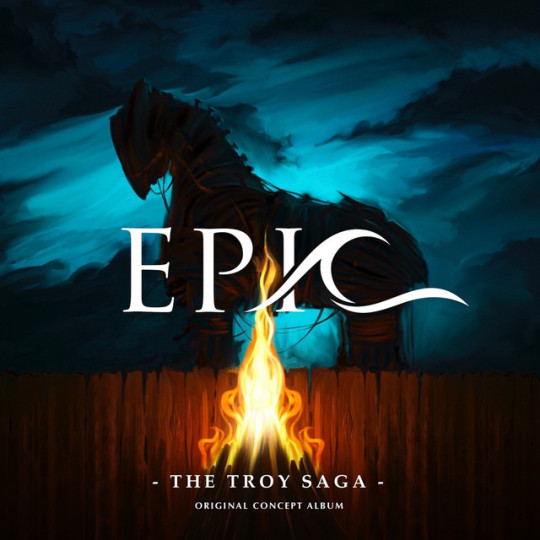
THE HORSE AND THE INFANT: Lots of names are being dropped here, so let's start with the main man himself, ODYSSEUS (Ὀδυσσεύς)! He is the son of LAËRTES (Λαέρτης) and ANTIKLEIA (Ἀντίκλεια), who is a granddaughter of the god HERMES (Ἑρμης), which I'm sure many would agree would probably explain a lot! In some versions, Odysseus' biological father is said to have been SISYPHOS (Σίσυφος), another mortal trickster, albeit a far more villainous one. Either way, clearly this runs in the family! He also has a sister named KTIMENE (Κτιμένη). And of course, there's his lovely wife PENELOPEIA (Πηνελόπεια), more commonly known as Penelope, and their son TELEMAKHOS (Τηλέμαχος).
Speaking of Penelope, the following story comes to us briefly from Pausanias' Description of Greece. Born in Sparta to King IKARIOS (Ικαριος) and the river nymph PERIBOEA (Περιβοια), it's said Princess Penelope was allowed to marry only after someone had beaten her father in a footrace. Of course, that someone ends up being Odysseus, but here's where the interesting part comes in: when discussing AIDOS (Αιδως), Modesty, Pausanias adds that Ikarius attempted to convince Odysseus to stay, and failing that, pleaded with Penelope. Odysseus, rather than challenge Ikarius or speak over his new bride, let her make the choice. But Penelope said nothing. Instead, she simply placed her veil over her face, her silent answer clear as day.
Next, we come to Telemachos, who was a newborn when his father left. However, it should be noted that Odysseus really didn't want to go. So much so that he feigned madness to try and get out of it, which was only foiled when PALAMEDES (Παλαμήδης) seized baby Telemachos and placed him right in front of where his father was recklessly ploughing the fields; Odysseus stopped immediately after noticing his son, but was then forced to join the war afterwards.
DIOMEDES (Διομηδης): one of the more notable Greeks during the Trojan War and a favorite of the goddess of wisdom alongside Odysseus, Diomedes was an intelligent and valiant soldier, to the point where he had even wounded the god of war himself. He also directly assisted Odysseus in Troy's downfall.
AGAMEMNON (Ἀγαμέμνων) and MENELAOS (Μενέλαος): Okay, these two have their own stories that I could make an entirely different post on, but for simplicity's sake, Agamemnon is the king of Mykenai and commander of the Akhaioí (Greeks); much of the Iliad concerns his feud with AKHILEUS (Ἀχιλλεύς) over the captive BRISEIS (Βρισηίς). Meanwhile, his brother Menelaos is king of Sparta and had been married to the reason this war started in the first place.
TEUCER (Τεῦκρος): one of the greatest archers, Teucer actually had Trojan blood through his mother HESIONE (Ἡσιόνη), who was the sister of King PRIAMOS (Πρίαμος), or Priam. Through his father TELAMON (Τελαμών), his elder half-brother is AIAS (Αἴας), or Ajax, the Greater.
AJAX THE LESSER: By the time of the Trojan War, there are two characters by the name of Ajax, with the Lesser referring to Ajax of Locris. He was known for having been a spearman and the fastest of the Greeks, but like many of his comrades, never made it back home after having earned the wrath of the gods.
NESTOR (Νέστωρ): the eldest of Greek army, he often offered wise, albeit long-winded, advice. At the end of the war, he was among the few who managed to return home safely.
HELEN (Ἑλένη): And now we get to the Reason. Well, sort of. Married to Menelaos and then PARIS (Πάρις), to blame the Trojan War solely on Helen would mean to disregard a lot of other things, such as the idea of KLEOS (κλέος)—glory—three powerful goddesses, a little golden apple, and even an entire plan to depopulate the earth. Sources vary as to whether Helen even left with Paris willingly, and that's not even getting into the versions where she didn't even make it to Troy at all! What is known, however, is that by the time we see her in the Iliad, Helen is nothing short of resentful. For example, during a confrontation with APHRODITE (Αφροδιτη), she says:
“You, goddess?
Why do you want to trick me in this way?
Will you keep leading me to yet more cities,
in Phrygia or in fine Maeonia
if any other mortal takes your fancy?
Now Menelaus has defeated Paris,
and wants to take me home with him again, although I am so hateful. Is that why
you come to me now with these tricks of yours? Then go to him yourself and sit beside him!
Give up the path of gods and let your feet
never turn back again to Mount Olympus!
Spend all your time on taking care of Paris,
crying for him, until he makes you either
his slave girl or his wife! But I will not
ever go back. It would bring retribution.
And I will never service that man’s bed.
All of the Trojan women in the future
will blame me if I do, and in my heart
I will endure more pain than I can measure.”
Aphrodite threatens her immediately following this, forcing her to go and comfort her new husband, but not before Helen tells him:
“So you came back from the fighting.
I wish that you had died out there, defeated
by that strong man who used to be my husband.
Before, you claimed you were superior
to warlike Menelaus in your strength
and hands and spear. So go on, challenge him!
Call Menelaus back again to fight you!
But no. I order you to stop. Do not
make war and fight with ruddy Menelaus.
It would be idiotic. You would soon
lose and lie dead beneath that fighter’s spear.”
According to a fragmented poem called Ilias mikra ( Ἰλιὰς μικρά), or Little Iliad, when Odysseus and Diomedes are sneaking into the city to steal their PALLADION (Παλλάδιον)—a wooden statue fashioned by the goddess of wisdom herself and said to be Troy's protector—Helen recognizes them, but never alerts the people in the walled city.
In terms of family, Helen had at the very least a daughter—HERMIONE (Ἑρμιόνη)—who had been about nine when she left (sources vary on whether she had other children or not), and she was also a first cousin of Penelope on her father's side. Though speaking of TYNDAREUS (Τυνδάρεος), prior to Helen making her choice of husband, one of the suitors present had suggested that should she be taken by anyone else—of which there actually had been a precedent for thanks to a certain Athenian king—they would all take up arms against that person to get her back. This would become known as the Oath of Tyndareus. What a brilliant idea, Odysseus.
NEOPTOLEMOS (Νεοπτόλεμος): son of Akhileus and called PYRRHOS (Πύρρος) at birth, Neoptolemos joined towards the end of the war and helped bring about the fall of Troy. Though young when he was called to arms, many sources often emphasize his brutality during this time, while others—such as Euripides and Sophocles—show him to be kinder, albeit torn in regards to the situation he's in.
And as for his father, Akhileus had actually been killed by Paris of all people, though not without divine help. Paris himself would later be killed by the archer PHILOKTETES (Φιλοκτήτης), and of Priam's remaining sons, Neoptolemos is credited by the Roman Quintus with having killed the following: POLITES (Πολίτης), PAMMON (Πάμμων), and ANTIPHONUS (Ἀντίφονόν).
JUST A MAN: Which brings us to ASTYANAX (Ἀστυάναξ), the infant son of HEKTOR (Ἕκτωρ) and ANDROMACHE (Ἀνδρομάχη). He is indeed killed because the Greeks feared his potential retribution, but the exact details aren't entirely consistent. In one version, he's killed by Neoptolemos, in others by Odysseus, be it directly or indirectly. In Seneca's The Trojan Women, the child even leaps off the walls himself. It's only in much later traditions does he survive.
As for his father, Hektor was said to have been the greatest fighter of the Trojans and had shown great kindness towards Helen for all of the twenty years she'd spent at Troy (yes, according to the very end of the Iliad, Helen specifically had been at Troy for twenty years at that point). The poem ends with his funeral.
FULL SPEED AHEAD: EURULOKHOS (Εὐρύλοχος) is not only Odysseus' second-in-command, but also his brother-in-law. His home is near Ithaka, on the island of Same. Polites (different one, of course) meanwhile is a very minor character in the Odyssey, but is still referred to as Odysseus' devoted friend.
OPEN ARMS: The LOTOPHAGOI (λωτοφάγοι), or lotus-eaters, were a race who—when consuming from a specific plant—would fall into a state of apathy to the point of never wishing to leave. This incident in the Odyssey is actually incredibly brief, with the crew arriving and then leaving immediately after Odysseus forces the men who ate from the lotus back on the ship.
WARRIOR OF THE MIND: Throughout both the Iliad as well as the Odyssey, ATHENA (Ἀθηνᾶ) acts as Odysseus' patron goddess. The boar "only the best could kill" is likely in reference to the famous Kalydonian Boar Hunt, which Odysseus is actually never mentioned as having taken a part in, but his father Laërtes did, depending on the source. The poem does reference a boar hunt, though, one that caused Odysseus to get scratched when he was still young.
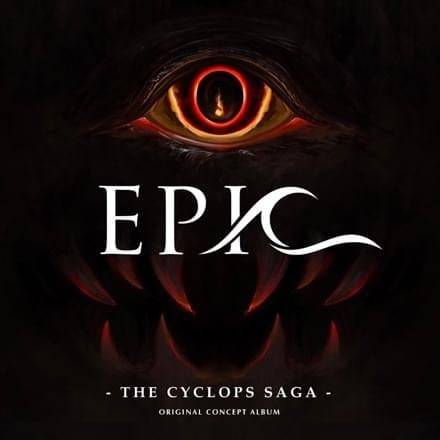
POLYPHEMUS: In this song, we officially meet, well, POLYPHEMOS (Πολύφημος), the KYKLOPS (Κυκλωψ). Odysseus and his man arrive at his island immediately after they leave the land of the lotus-eaters, find a cave filled with cheese and sheep, and...
My crew begged, ‘Let us grab
some cheese and quickly drive the kids and lambs
out of their pens and down to our swift ships,
and sail away across the salty water!’
That would have been the better choice. But I refused. I hoped to see him, and find out
if he would give us gifts.
Obviously, this doesn't turn out to be the case. What needs to be understood, however, is that Odysseus and his crew were technically guests, so he would've expected Polyphemos to uphold XENIA (ξενία), sacred hospitality, something he even makes clear in the poem. He hadn't anticipated for Polyphemos to have no fear of the gods. The next morning, Odysseus gives him wine gifted to him by a priest of APOLLON (Ἀπόλλων) named MARON (Μάρων); Polyphemos finds it so delicious that he even compares it to nectar, the drink of the gods. Yet still, this wasn't enough to persuade the kyklops to free them.
SURVIVE: In the original poem, Odysseus is mentioned to have had several men eaten by Polyphemos, though the only one actually named is ANTIPHOS (Ἄντιφος).
REMEMBER THEM: It's worse in the poem.
‘Hey, you, Cyclops! Idiot!
The crew trapped in your cave did not belong
to some poor weakling. Well, you had it coming!
You had no shame at eating your own guests!
So Zeus and other gods have paid you back.’
[...]
My crew
begged me to stop, and pleaded with me.
‘Please! Calm down! Why are you being so insistent
and taunting this wild man? He hurled that stone
and drove our ship right back to land. We thought
that we were going to die. If he had heard us,
he would have hurled a jagged rock and crushed
our heads and wooden ship. He throws so hard!’
But my tough heart was not convinced; I was still furious, and shouted back again,
‘Cyclops! If any mortal asks you how
your eye was mutilated and made blind,
say that Odysseus, the city-sacker, Laertes’ son, who lives in Ithaca,
destroyed your sight.’
Then it's immediately revealed this had been part of a prophecy.

Like MY GOODBYE, I honestly don't think there's much for me to talk about STORM and LUCK RUNS OUT, at least not at the moment, so let's move on to KEEP YOUR FRIENDS CLOSE, where we meet AIOLOS (Αιολος)! His island in the sky is named, fittingly, Aiolia, and he lives there with his wife and twelve children. Though initially receiving Odysseus and his crew warmly, once the bag of winds was opened and returned them to the island, Odysseus tried to ask for his help again, but Aiolos simply demanded that they leave, figuring the men were disfavored by the gods.
And finally, we have RUTHLESSNESS! After being rejected by the wind god, the crew come across the LAISTRYGONES (Λαιστρυγονες), giants who ate the crew and destroyed the ships until only one vessel remained. According to Hesiod, they sprang from Laistrygon (Λαιστρυγων), whose father was POSEIDON (Ποσειδων).
Poseidon as he appears in many myths is, in one word, ruthless, cursing Odysseus almost as soon as his son Polyphemus prays to him for vengeance. In certain myths, he is also portrayed as a rival to Athena, such as when the two competed for dominion over the then unnamed Athens; Poseidon offered them the first horse and Athena the first olive tree. To quote Emily Wilson:
Whereas Poseidon favors the untamed world of the stormy sea, Athena loves fixed settlements and the olive tree—a crop
whose oil was used in archaic Greece for cooking and skin care. Poseidon
makes the earth shake; Athena makes even the most rugged, barren
landscape available for cultivation.
As far as the Trojan War itself is concerned, according to many sources, Poseidon actually helped build the famous walls of Troy alongside Apollo, but when the king at the time, LAOMEDON (Λαομέδων), refused to pay them, Apollo sent a plague and Poseidon sent KETOS (Κητος), a sea monster which would then be slain by HERAKLES (Ἑρακλης) just before the monster could eat Princess Hesione; Laomedon, having learned nothing from last time, refused to pay Herakles, who would then go on to sack the city in retaliation. Poseidon would later side with the Greeks during the war, but here's the interesting part: while the Trojan War has no set date, one proposed theory is 1275 BC, as that was around when historical Troy (specifically Troy VI) was believed to have been destroyed by an earthquake. Furthermore, what animal was carved out of wood for the final ambush? A horse!

#homer#greek mythology#the iliad#the odyssey#emily wilson#musicals#epic: the musical#epic the musical#epic: the troy saga#epic the troy saga#epic: the cyclops saga#epic the cyclops saga#epic: the ocean saga#epic the ocean saga#odysseus#penelope#telemachus#eurylochus#polites#lotus eaters#athena#polyphemus#aeolus#laestrygonians#poseidon
11 notes
·
View notes
Note
Hey coward <3 drop the name of the Menody book, NOW
the one from my pride post?
it's part of an odysseus duology. like about his past.
the first one is called murder at mykenai and can be found HERE
the second is called the bow and can be found HERE
menelaus is very much in the first one, and he floats a little more in the second. he gets drunk a lot too.
#odysseus has the nickname 'ollie' for some reason#and he and menelaus are best friends??? and argos is always with them??#honestly. wholesome.#menelaus and odysseus have that very cliche ......#two best friends in a YA/middle-greade book style friendship#were they're a little TOO obsessed with each other SDFGHJ#they're actually really fucking enjoyable books i cant lie
29 notes
·
View notes
Text
At the Battle of Thermopylae, there were
300 Spartiates (plus helots who fought, but were never mentioned even in Herodotus; at least one per Spartan, but almost certainly more);
500 hoplites from Mantinea;
500 from Tegea;
120 from (Arkadian) Orchomenos;
1000 from ‘the rest of’ Arkadia;
400 from Korinth;
200 from Phlios;
80 from Mykenai;
the ‘full fighting force’ of Opous (in Lokris - no number given);
700 from Thespiai;
400 from Thebes;
1000 from Phokis.
[Herodotus, 7.202-3]
That’s ~ 5000 hoplites.
Not 300.
5000.
#ancient sparta#sparta#ancient greece#ancient history#spartan history#the battle of thermopylae#300#ancient propaganda
6 notes
·
View notes
Text
* herakles: blood-stained champion.
basic-ass profile series.

portrayal notes.
Herakles the Lionhearted, son of Zeus. Culture Hero. God. Murderer.
Vibes-based portrayal while I pin down the various tales that make up the man, the myth, the legend of Herakles. Currently mainlining The Oxford Handbook of Heracles ed. by Daniel Ogden to get my bearings.
Themes centered on the meaning of heroism and violence and what happens when the bigge damn hero is more terrifying than the monsters he slays.
Interested in exploring the fall of a hero :’) (but a hero should rise before he falls, yes?)
Tertiary, Pre/Epic Cycle. Verses include (but not limited to) myth canon, myth AU, modern, and uhhh… Just about anywhere I can slot him in tbh.

basics.
Alkaios of Thebes Herakles
God of Strength and Heroes; Divine Protector of Mankind, Patron of the Gymnasium
Theban-born, but of Mykenai heritage (Tyrins, Troezen) / Aegan
Of white, Black, and mixed indigenous Mexican descent in non-myth verses
Pre/Epic Cycle
appearance.
His aura is what's larger than life — the man himself is on the taller side for a man of his era, but hardly the towering height most people imagine based on his exploits.
Bronzed bc regardless of the existence of sunscreen, he's not gonna wear it. Dark brown hair, curled and thick. Dark eyes that would never be called cow-like.
A thick dark beard and plenty of body hair as well. If he were a mortal man who changed and aged over time as one, he'd be one hell of a bear. Or, well, "dad bod" for those who aren't MLM.
relationships.
DIVINE HERITAGE: Zeus (father; grandsire); Hera
NOTABLE ANCESTORS: Perseus
PARENTS: Alcmene of Mykenai and Zeus (divine); Aphitryon (mortal); Rhadamanthus (stepfather)
SIBLINGS: many divine siblings by his divine father; Iphikles and Laonome
SPOUSE: Megara, princess of Thebes; Omphale, queen of Lydia; Deianira, princess of Calydon; Hebe, goddess of Youth
LOVERS: enough of them that I need time to collect a list of names and make a separate headcanon post.
CHILDREN: Some say there are over 100. Tbf some of those are now dead.
CONNECTIONS: honestly? Probably everyone.
personality.
The duality of Heracles is that he is both the best and worst person you could ever meet. He’d literally go to Hades and back to repay what’s a relatively small favor.
He’s also known for impulsive acts of great violence, both in infancy (against the snakes Hera sent to his crib) and in adolescence (the murder of his music teacher, Linus)
He can be extremely generous and exceedingly loyal, boisterous drinker and a genial guest.
He is also violent, arrogant, and impulsive. He is intolerant to the faintest slight and is capable of extreme brutality.
Awful in both senses, inspiring awe and dread.
need to know.
Typical ancient Greek male sexuality in that he has his wife and then both male and female lovers. Less important than the gender of his partners is that he’s (usually) the top.
Only Omphale has had the honor of topping Herakles in his whole dang life.
Grew up possibly in Thebes???
Timeline goes: some adventures > marriage to Megara > some adventures > madness and murder of family > 12 Labors in part to cleanse his soul of miasma of his murders > more adventures.
There’s so much to know lkajsf;fsdaasfd
I’ll update this when I know what’s the most need-to-know
1 note
·
View note
Text
attendants of artemis - apotheosed maidens
aspalis ~ a girl of phthiotis who was granted immortality by artemis after her death. she became the protecting temple spirit of the goddess’ shrine in phthian melite .
britomartis ~ a girl of krete who became an immortal companion of artemis after she leapt into the sea whilst fleeing from the lustful pursuit of king minos.
hekaerge, loxo & oupis ~ three hyperborean maidens (of the mythical northern land) who became immortal companions of artemis after their death on the island of delos. they tended the goddess’ shrine on the island of delos.
iphigeneia ~ a princess of mykenai who artmemis made immortal after she was offered up to the goddess as sacrifice.
makaria-eukleia ~ a lady of thebes or attika who artemis made immortal after she sacrificed herself for her family.
parthenos & hemithea ~ two princesses of the island of naxos who were granted immortality by apollon. they became companions of artemis.
phylonoe ~ a princess of lakedaimonia who was made immortal by artemis. she was related to, if not the same as, polyboia below.
polyboia ~ a princess of lakedaimonia who was made immortal by artemus. she was related to, if not the same as, phylonoe above .
114 notes
·
View notes
Note
Hi I just saw an interpretation on Hera’s motivations for scorning Zeus’s children and I wanted to know your take on it. (And maybe, possibly how it will play out in ATLOP). Basically the reason behind Hera scorning Heracles and Dionysus was because they were set to inherit something of Zeus’s, and the main purpose of marriage back then was to produce heirs to inherit the father’s land and ect. so by giving children that we’re not her own inheritance, Hera was slighted. They also said that was why most of Zeus’s female children were left alone, because they could not inherit. I feel like there’s a lot more to it than that but I thought they raised an interesting point
cracks neck okay so it’s 230 am, I have an 8 am, and I really should be going to bed. But instead I’m going to answer a shit ton of asks (and queue most of them). So!
Thank you @izzymrdb for your additional stunning lecture on this subject <3 You always have something new to teach me no matter how much I learn.
Now then!
Interpretation of Hera’s Actions
There are several points to cover here so I’ll be going through them one by one.
The Time Period
A large number of the myths don’t occur in Hellenistic Greece, but in Mycenaean Greece. Hellenistic Greece is heavily influenced by Athens. Mycenaean Greece is influenced by the Minoans (and Mykenai). We don't know much about those two, but there are lots of theories and studies done on possibilities for them. And of course we have the Iliad and the Odyssey to offer some light, tho some would argue these aren't reliable sources (they are one of our only sources so... I use them).
The things you say are somewhat true... but not for Mycenaean Greece.
Inheritance
While it is true that in Hellenistic Greece girls couldn’t inherit (except in Sparta), in Mycenaean Greece this was not the case. Let’s look at an example.
Helen of Sparta
She was the youngest of her siblings, with at least three older than her (number varies). Two brothers and a sister. Castor and Pollux take themselves from the inheritance, wanting to have fun, not challenge each other for the inheritance (as twins), and wanted to marry into a family. Clytemnestra gave up her spot due to a thing involving Theseus (not elaborating atm).
So Helen inherited Sparta, and Menelaus married into it. The two ruled together and they were good rulers. Notably, their only daughter (and only child) Hermione also inherited.
Marriage
The main purpose of marriage was actually not to have children to inherit back then. Any child of the family could inherit, be they bastard or not. There are many stories of bastard children coming back taking the throne, or at least trying to. And many of the mortal children of the Gods would be considered bastard children. Yet if you look at the rulers of the time, a good number are children of the Gods.
The purpose of marriage was to build alliances, strengthen your kingdom, or to protect the daughter marrying in. So long as you had a child, the child had the possibility of inheriting, no matter the parent. So children were a secondary matter.
This is of course not to say that having children wasn't considered important, and in later times it definitely was a bigger factor in marriage, but from what we can tell from the few sources we have it seemed to be of secondary importance to the other factors mentioned.
Dionysus and Herakles
Now, you (the person you heard from) missed something very important in this claim that it was because Dionysus and Herakles were to inherit something that Hera would scorn them.
They were born mortal.
There was nothing other than the powers they inherited from Zeus that they could inherit as mortals. The inheritance of Zeus would be divine, and they were not divine.
Now, this is a good time to talk about misconceptions of the myths. Most consider Hera scorning them solely because they are Zeus’ children, but that’s just not true.
Athena is a child of Zeus, yet Hera has never had an issue with her. Athena is the result of Zeus’ first marriage, and Hera more than respects the sanctity of marriage.
Hera is shown to have some issue with Apollo and Artemis, but only for a short time. And even when they had clashes in Apollo and Artemis’ youth, it is not angry. There is no hate there.
No, Hera had a problem with Leto. Leto knowingly laid with Zeus and was to bear his children, despite knowing that Zeus was married. In some myths she’s called a wife of Zeus, but Hera’s actions would be taken with Leto not being a wife of Zeus.
Then come Herakles and Dionysus. Hera clearly dislikes them, why might that be?
Herakles was a child of Zeus being unfaithful, but Hera was originally content to ignore him even if she was angry. But then the child was named after her, the Goddess of Marriage, as if the child wasn’t a result of unfaithfulness. And then she was tricked into breastfeeding him, the child of another woman.
These are great insults, and thus she lashed out.
She curses him, she torments him, she rages at this child who was forced into her eye no matter her own desires.
And it is due to her actions that he becomes a God.
Dionysus was not Hera’s original target, and indeed she did not target him originally. It was his mother she targeted. Semele was targeted because she knowingly laid with a married man, the King of the Gods even. She knowingly aided him in being unfaithful, which is a great crime for Hera.
When Dionysus grew older he was... understandably angry about Hera leading to his mother’s death, and he gave her insult. Thus she targeted him as well... and in the process started him on the path to become a God.
Hera did not lash out because they were Zeus’ children, she lashed out because she was insulted in regards to them. The parents were the target of her rage prior to that.
The Meaning
Now what does this all mean? I mean Hera is lashing out, so what’s the lesson here?
There has to be a lesson after all, the myths were used to teach lessons. They were used to teach people how to act, how to be, how to believe. They taught the beliefs of the time, what the people of the time believed right and wrong. And for entertainment of course. But the lesson is the focus rn.
Hera is the Goddess of Marriage, she is the embodiment of faithful marriage. She would never be with another, she would never have a child away from Zeus. But that is not what Zeus is. There are lessons relating to this that one can draw, but the focus here is the lesson to be drawn from Hera’s own actions with Zeus’ children.
Hera’s actions led to the children of her Husband becoming Gods. Without her lashing out that would not have happened, they would’ve lived and died and possibly even been punished in death for the insults to the Queen of the Gods.
The lesson here is to not lash out when insulted by your husband.
This was what was valued in the time, a loyal and devout wife who would not lash out at their husband for being with others. Who would not lash out at the children of such unions.
Hera targeting his children was not about them being his children, there were more factors involved. And the lesson to be learned is not about inheritance, it is about Hera lashing out at the insult, and the children becoming Gods as a result.
So hope this helps anon <3
EDIT: brief edit on time period details as I mixed a few things up. Hellenistic, not Hellenic.
#anon asks#life answers#hera#hera deity#ancient greece#greek mythology#hellenic greece#mycenaean greece#athena#athena deity#zeus#zeus deity#apollo#apollo deity#artemis#artemis deity#hellenic chat#shall add a note here about how the Iliad is not always considered a reliable source and its up to the interpreter#on whether they wish to use it#i do#also some would argue theres no lesson#i disagree strongly#lessons are in all stories whether intended or not#i cannot say for sure whether the lesson was intended#but it would an inherent aspect of the story#hera is the Goddess of Marriage thus the mortals beliefs on marriage would influence any story depicting her
127 notes
·
View notes
Text
"Argos’ internal reinvention starts with the catastrophic defeat by Sparta at Sepeia in 494 bc. Much discussed in the ancient sources, as if tradition were aware of a pivotal moment in Argive history, this sets off the—mutually dependent—processes of synoikism, democratization, and increase in military strength. This legendary battle depleted the Argive citizenry by 6,000 casualties, leading to a mass enfranchisement, but no text is quite clear about who these newly enrolled people were: they are interchangeably called ‘slaves’, ‘perioikoi’, and also sometimes thought to be the people of Tiryns; Argives also had a large number of dependent cities in the archaic period, and a significant helot-type population, called gymnetes. The ancient tradition is generally sceptical with regard to the Herodotean ‘slaves’, and the one attempt to explain the unusual move makes it quite clear that what is at stake in the enfranchisement is the quality of the men, not their social class: Diodorus says that the remaining Argives thought it better to give freedom to their ‘slaves’ than share government with the ‘rabble’, suggesting new citizens taken from the neighbouring cities rather than the Argive demos. While the problem of this emerging new citizenry just cannot be solved, it seems pretty clear that the battle of Sepeia set off both the enfranchisement of people of the Plain and the likely incorporation of their land into the Argive polis. …
The following period in Argive history, misleadingly termed interregnum servile, ended when the sons of the killed warriors were old enough to take up their fathers’ legacy. Although the ‘slaves’ flee, to Tiryns, we have no evidence that this also entailed a return to oligarchy. Quite the contrary, whoever was in charge at Argos from the 470s or so onwards capitalized on what in 494 bc might have seemed the bad fortune of having to empower the dwellers-around. For this generation also spans the period when the Argives systematically get to grips with the Argive Plain by wiping out one by one Mykenai, Tiryns, and Midea during the 460s bc. How fully these cities were destroyed, however, is at least in the case of Tiryns open to debate: we have epigraphic notice of people fleeing, significantly, to the cities on the Akte, to Epidauros and to Halieis. Pausanias mentions— without giving an idea of the time frame—that the Argives incorporated the Tirynthians as synoikoi ‘because they wanted to enlarge their city’ and he also knows of the eponymous hero Tiryns turned into Argos’ son. Below we shall come across more such indications that the integration into Argos of Tiryns’ inhabitants together with their traditions was at least as prominent as was their expulsion. So while the supposed flattening of the three cities may have meant exile for some members of the local elites of the Plain, for others it entailed being synoikized into the socially restructured Argive polis. …
We can trace in some detail a new identity, plausibly a new community, being crafted in the Argeia. While with modern hindsight a redirection of the Plain’s religious traditions towards Argos may not appear spectacular, from an early fifth-century perspective the Argive appropriation and reinterpretation of the Plain’s rich traditions is baffling. We need to dig a little further into the utterly confusing pasts of the Plain, into a complexity that suggests the area’s great dynamism over a long period of time.
As discussed above, Argos overwhelmingly shares traditions with the Akte, much less with the rest of the Plain. On the other hand, Argives no doubt have a constant eye on the Plain, creating a rather irregular web of cults and associated mythical figures. Jonathan Hall has recently suggested some sort of system behind the dense grid of mythology covering the Plain, arguing for competitive traditions rooted at Argos and in the Eastern Plain respectively, each with an unfulfilled claim to control of the entire area. On that reading, Argos would be the hub of the descendants of King Proitos who culminate in the personnel of the Seven against Thebes. By contrast, the family of Perseus, producing Herakles and eventually the Atreids and Trojan warriors, are located in the Eastern Plain, particularly Mykenai. This division cannot be fully supported; but the tentative separation does account for the respective geographical clustering of traditions and, what is perhaps worth more, their monumentalization at Argos. The Seven, often neglected in favour of the greater warriors of Troy, are endowed with a sixth-century heroon in the centre of the Argive polis. Pausanias’ downtown Argos fully commemorates this set of heroes. By contrast, monuments to the Trojan War cycle are oblique and references certainly in Pausanias very general. This is so conspicuous that one starts wondering whether Herodotus’ important notice, that the warriors of Troy were the targets of Kleisthenes of Sikyon’s hatred against Argives, refers, rather than to a well-established presence of the Trojan cycle warriors at Argos, to Argive sixth-century myth-making rather than long-standing cultic reality. In the Eastern Plain, this situation is reversed; the heroes of Troy receive a full showing whilst the Seven are virtually absent.
Similarly, the current view that Hera dominates the cities of the Eastern Plain, but cedes precedence to Apollo and Athena as patrons of Argos itself is extreme, but in essence probably right. Argos, none the less, always had a keen eye to the Heraion in the Eastern Plain which symbolized control of the entire Argeia and, more importantly, its traditions. If the Spartan king Kleomenes chooses the Heraion for a sacrifice marking the end of his campaign against Argos after Sepeia, this should be taken seriously, symbolizing Argive claims perhaps more than Argive realities in the early fifth century. However, archaeology warns that a privileged relationship of Argos to the Heraion is difficult to prove prior to the mid-fifth century; rather, it is Mykenai that cultivates this goddess; and Hera guards the cities of the Eastern Plain, whilst at Argos she is less prominent. Fifth-century Argive flattening of the Eastern Plain and subsequent synoikism inverses the distribution of these figures of myth and cult when the Seven march into the Plain, and the inhabitants of the Plain, the Heraion, Herakles, and the warriors of Troy, take an Argive direction. The Heraion at Prosymna in the course of the fifth century came under Argive auspices; a new temple was built in the 460s, the festival restructured, and the Heraia, games in honour of Hera, were either introduced from scratch, or elevated to Panhellenic status."
- Singing for the Gods: Performances of Myth and Ritual in Archaic and Classical Greece by Barbara Kowalzig
2 notes
·
View notes
Text
Deuses e Seus Epítetos - Hera
Dando continuidade a nossa série que aborda um pouquinho sobre cada uma das principais deidades helênicas, damos continuidade com Hera - a Rainha dos Deuses, Deusa dos céus, casamento e das mulheres.
Hera é uma figura poderosíssima conhecida por ser a mãe de muitos dos Deuses, como Ares, Hebe, Ilítia e Hefesto, além de sua ferrenha perseguição aos filhos bastardos de seu marido, como os gêmeos Apolo e Ártemis, e até os (até então) semideuses Héracles e Baco.
Conhecida como a matrona da região de Argos na Grécia e figurando com sua autoridade incontestável de rainha, Hera é a responsável por abençoar nascimentos, proteger linhagens e é também descrita nos hinos órficos como a Deusa que coordena os ventos e chuva como parte de seu domínio celeste. Uma mãe, uma rainha e uma poderosa Deusa, Hera é uma das divindades olimpianas mais importantes e veneráveis.

Hera tinha inúmeros templos espalhados por toda a Grécia, seus locais de maior culto entretanto eram a cidade de Olímpia, na região de Elis, e o heraion de Mykenai, na região de Argos. Ela sempre é retratada como uma jovem mulher régia com atributos de uma rainha: Coroa e cetro, frequentemente acompanhada de um pavão ou um cuco, seus animais sagrados.
Seus epítetos descrevem-na em suas inúmeras qualidades e potências. Vejamos aqui alguns, separando-os em categorias.
MULHERES
Pais / Nympheuomene / Teleia / Khêra - (Criança / Noiva prometida / Adulta / Viúva) A rainha do Olimpo é descrita em epítetos que descrevem várias partes da vivência feminina. Notavelmente, estes epítetos evidenciam o quanto todas as mulheres estão sob o domínio e cuidado de Hera, não importando a fase da vida.
CASAMENTO & VIDA CONJUGAL
Afroditê / Gamelia / Autorôtê / Zygia - (de Afrodite / do Casamento / Virgem / Comprometida ) Não apenas descrevendo seu domínio sobre as uniões amorosas que se firmam em casamento, Hera é descrita como a rainha de todas as partes desta honrosa união e compromisso, sagrados a Ela.
PROTEÇÃO
Alexandros - "Protetora das Pessoas" Hera, sendo uma poderosa Deusa olimpiana e rainha do Olimpo, é também conhecida por ser uma protetora dos mortais.
Hypercheiria - "[Cuja] mão está elevada" Este epíteto advem de seu culto em Esparta, descrevendo seu domínio e proteção que vem do firmamento, seu domínio.
MISCELÂNEA:
Anthea - "das flores"
Henioche - "das carruagens"
Argoeia - "de Argos"
Boopis - "dos olhos de vaca"
Levando em consideração que estes são apenas alguns epítetos dentre seus vários descritores, sejam de culto ou de ordem poética. Os hinos homéricos descrevem Hera como a mais bela Deusa do Olimpo, e os tardios hinos órficos descrevem seu domínio celeste sobre o ar e a chuva, demonstrando sua influência sobre a própria natureza.
Um de seus mais famosos festivais é a Theogamia, onde seu casamento com Zeus é celebrado, o festival busca a fertilidade sob a benção das chuvas sobre a terra, além de ser um período propício para o casamento.
Na atualidade ainda vemos Hera em seu domínio inefável e incontestável como a Rainha dos Deuses. Sua proteção se estende a todos os mortais e seu domínio sobre nossas relações, sejam elas familiares ou matrimoniais, demonstram sua nobre e venerável figura.
Que Hera continue a nos abençoar com sólidos vínculos recheados de amor e nos tenha em sua sagrada proteção. Nos despedimos hoje com o hino órfico à Hera:
Ó Hera da realeza, de modos majestosos, formada no etéreo, divina, rainha abençoada de Zeus, entronada no âmago do ár cerúleo (cor-do-céu), a raça dos mortais é teu costante cuidado. As resfrescantes ventanias, elas sozinhas já inspiram poder, que nutre a vida, que toda a vida deseja. Mãe dos chuviscos e ventos, a ti apenas, produzindo todas as coisas, a vida mortal é conhecida: toda a natureza compartilha o teu temperamento divino, e o domínio universal é apenas teu, com sonoras rajadas de vento, o mar que se expande e os rios que fluem e bradam quando sacudidos por ti. Venha, abençoada Deusa, poderosa e renomada rainha, de aspecto gentil, rejubiloso e sereno.
#hera#hera deity#epithets#epítetos#helenismo#politeísmo helênico#helpol#hellenic polytheism#hellenismos
62 notes
·
View notes
Quote
Among the scholars of Indo-European religion, much ink has been spilled over the negation of death through the consumption of sacred foods. The gods were believed to be immortal only inasmuch as they were steadily supplied with their fix of ἀμβροσία (ambrosia), nectar, amṛta, or Soma. The poet of the Rigveda writes: “We have drunk Soma and become immortal; we have attained the light, the Gods discovered. Now what may foeman’s malice do to harm us?” The Greek ἀμβροσία is etymologically bound to the Sanskrit amṛta (अमृत), which is synonymous with the god-substance Soma. Both of these mythical substances were preserved in Indo-European lore as the food and drink from which the gods maintained their immortality. Suetonius wrote of the mushrooms in which are generated a poison (or drug, uenenum) as deorum cibum following the Greek convention which called mushrooms βρῶμα θεῶν, the “food of the gods.” The Mycenaeans of ‘Mykenai’ derived their own name from the μύκης (mukes), suggesting the importance of the mushroom to that branch of Indo-European culture. The Greek word for mushroom itself, ‘μύκης,’ can be traced back to the syllabary Mycenaean period.
Dan Attrell - Shamanism and the Mysteries: A Brief History of the Cult of Ecstasy
12 notes
·
View notes
Photo
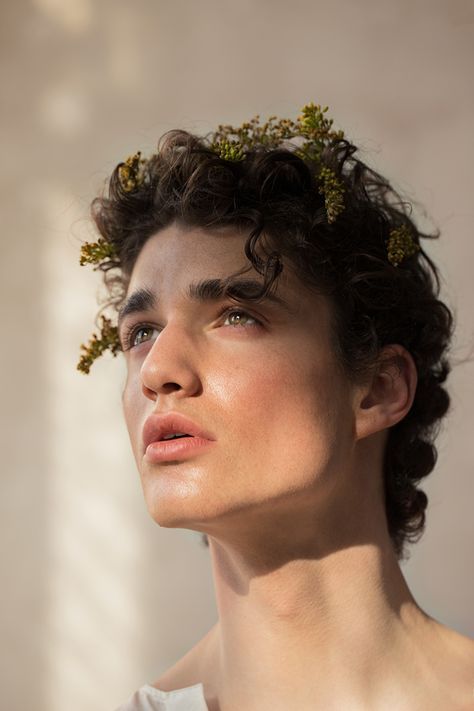
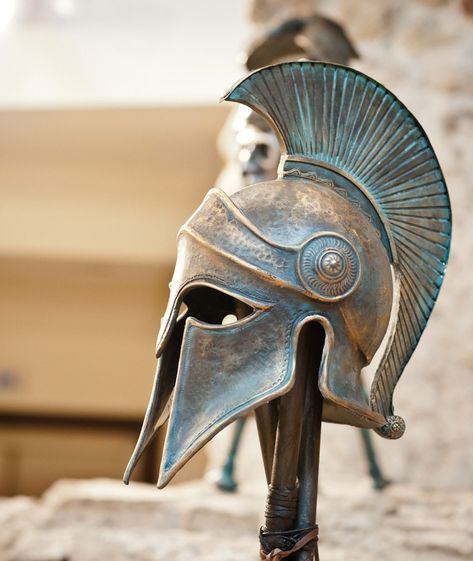

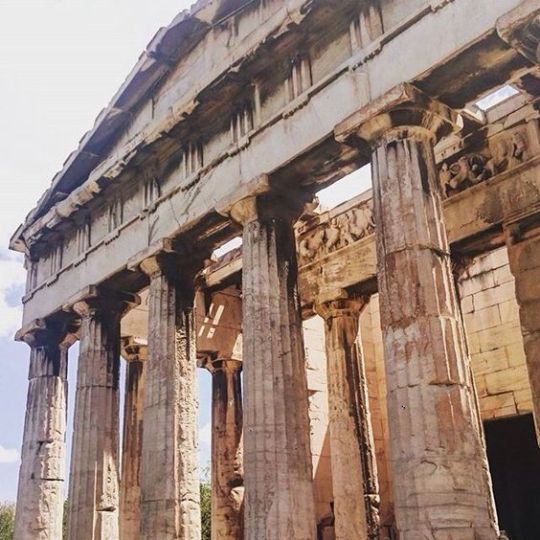
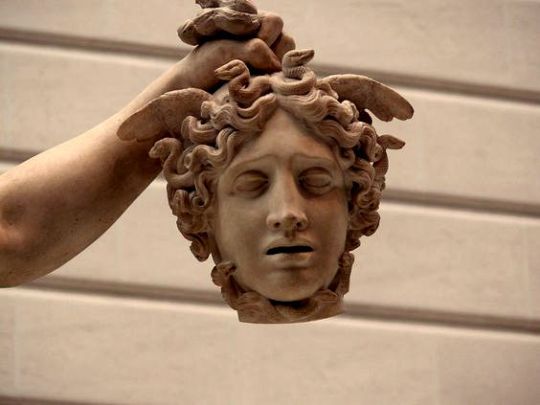
Περσευς
Perseus was one of the most celebrated heroes of Greek mythology.
He was the son of the Argive princess Danae who was locked away in a bronze chamber by her father Akrisios who lived in fear of a prophecy that he would one day be killed by her son. The god Zeus, however, infiltrated her prison in the guise of a golden shower and impreganted her. When Akrisios discovered the child, he placed the two in a chest and set them adrift at the sea. They were carried safely to the island of Seriphos where they were offered refuge by the kindly, fisherman Diktys.
When Perseus was fully grown, King Polydektes commanded he fetch the head of Medusa. With the help of the gods, Perseus obtained winged sandals, an invisible helm and a magical sword. He then sought out the ancient Graiai and stealing their single eye compelled them to reveal the location of the Gorgones. Perseus approached Medusa as she slept and beheaded her with eyes averted to avoid her petrifying visage.
On his journey back to Greece, Perseus came across the Ethiopian princess Andromeda chained to a rock as a sacrifice to a sea-monster. He slew the beast and brought her with him back to Greece as his bride.
Perseus was the ancestor of the royal houses of Mykenai, Elis, Sparta, Messenia, and distant Persia. His most famous descendant was Herakles.
#perseus#heroe#Greek Mythology#danae#akrisios#zeus#diktys#polydektes#medusa#graiai#gorgones#gorgon#greece#andromeda#mykene#herakles#myth#mythology#greek
425 notes
·
View notes
Text
Pengayal
Tubuh para begawan membusuk di pelataran tempat Atreus dinisbah sebagai takhta berdarah Mykenai tepat sesaat pasang gelombang merudapaksa pilar-pilar bandarsyah dan lekara tak lagi bisa dipantaikan setelah fajar mengufuk baya walau hukum telah ditera pada pualam pembelah langit atau kemulit piara Isa untuk mewartakan siapa yang nanti akan dilupa di lembaran kitab kuning juru falak hingga uar pelantang kedai pelacuran tempat Judas menggadaikan kembali keping selaka di hadapan Tuhan yang nantinya akan dimisakan berulang tanpa jirat juga selar api pemburu kota hingga lindur dan jaga kian menolak untuk bersitakar dalam sinambung yang sekelibat seadanya namun tak pernah seberadanya.
3 notes
·
View notes
